Last Updated: 13/07/2025
Author: Dr Belinda Stancombe BVSc (Hons)
Reading Time: 23 minutes - medium read
No one likes talking about poop! Unfortunately, Number Twos and their clean-up are a part of pet ownership. While looking at your cat's poop may not be your idea of a fun time, their stool quality can actually tell you a lot about their current gut health, digestion, and general well-being.
So what does a normal poo look like, and what affects the quality of our pets' stool? It is fair to say that when it comes to poo, what goes in directly affects what comes out.
Our Cat Pootorial discusses all things poo! Learn about the different types of poo and what they mean. Discover why what 'goes in' affects what 'comes out', plus poop scooping tips for a cleaner pet and environment. Make every day a good poo day!
DID YOU KNOW: With 5.3 million cats in Australia - each using an average of 45kg of litter per year - that's 238,000 tonnes of waste every year or 4.5 times the weight of the Sydney Harbour Bridge!
The Scoop On Your Cat's Poop
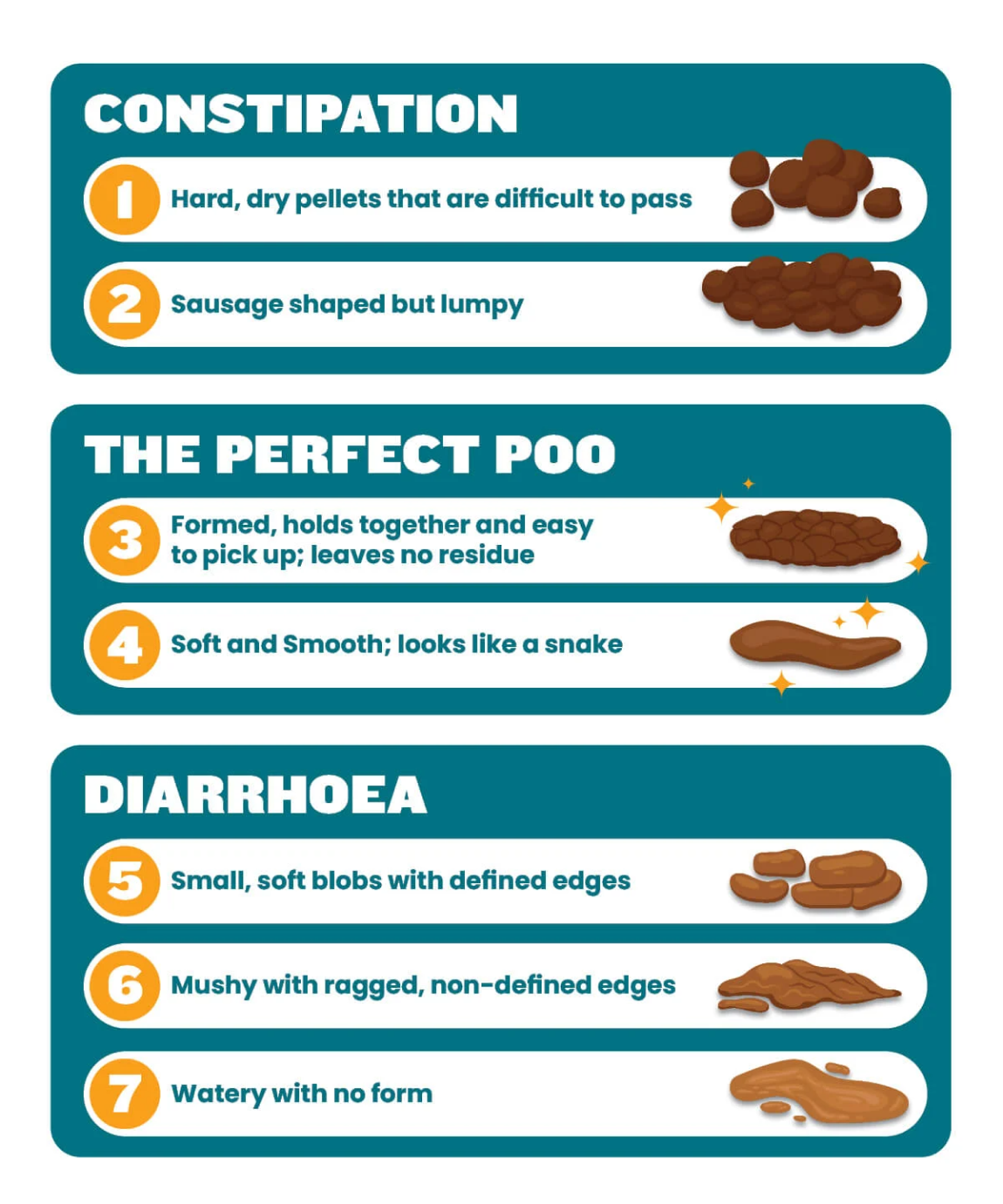
CONSTIPATION (Type 1 & 2)
Cats that produce hard, pellet-like poo may be suffering from constipation. Constipation is the infrequent or difficult passage of faeces.
It is common for pets suffering from constipation to strain and pass small hard and dry pellet-like faeces, which can be painful. As the colon's main function is to absorb water from the digestive tract, faeces that are retained for an extended period of time, become hard and dry, making them more difficult to pass.
Common causes of constipation can include diet, hairballs, dehydration, medication, megacolon or pain that makes defecation difficult such as arthritis.
THE PERFECT POO (Type 3 & 4)
A perfect or healthy poo resembles formed faeces which is easy to pass and can be picked up or scooped, without leaving residue or falling apart.
DIARRHOEA (Type 5, 6 & 7)
Diarrhoea is the passing of soft or watery faeces, with increased frequency and water content. Most cats will suffer from diarrhoea at some point in their life, but chronic diarrhoea can be a sign of a more serious underlying condition.
Some common causes of diarrhoea include diet change, dietary indiscretion, food allergy or intolerance, parasites, bacterial infection or viruses.
Looking for more information? Read our veterinary written article The Scoop On Your Cat's Poop.
What Goes In....
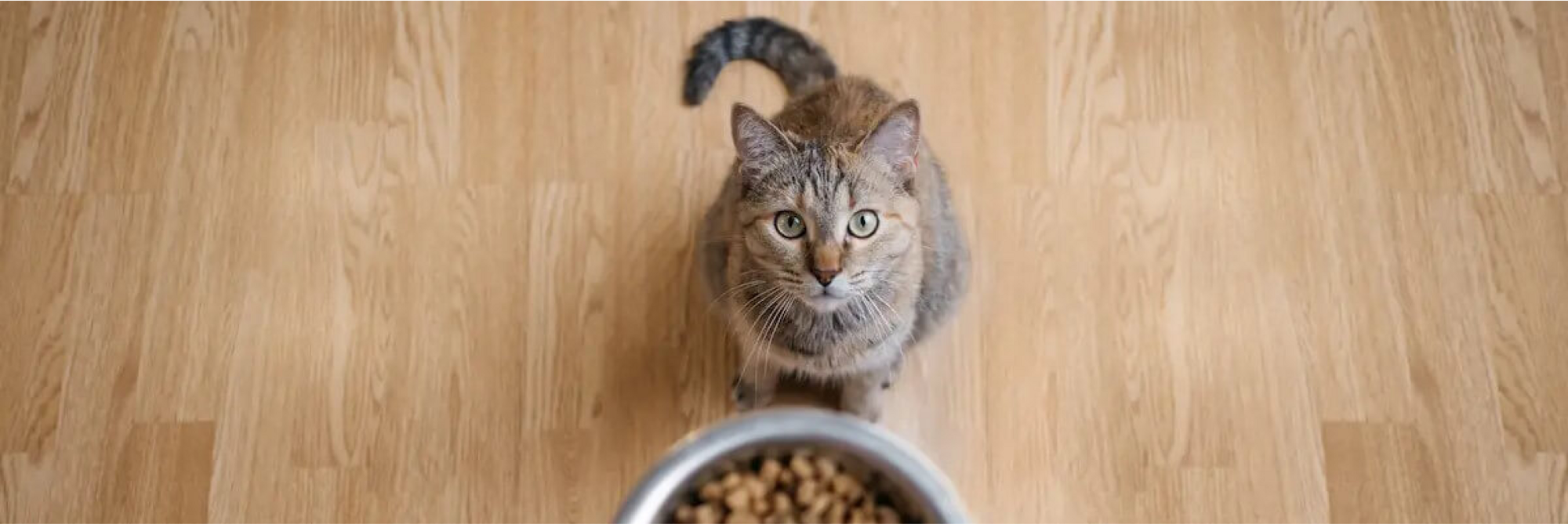
The quality and consistency of your pet's poo is very much affected by what goes 'in'. Consuming high quality products that support good health and digestion such as a premium or sensitive stomach diets and dietary supplements is more likely to produce a perfect poo, which is much easier to clean up!
Premium Diets
Premium diets are complete and balanced and highly digestible, which means your cat can extract greater nutrients from their food, leading to less waste and more compact poo. Premium diets are formulated with beneficial ingredients such as additional fibre and pre and probiotics to boost healthy digestion. Pets fed a premium diet often produce smaller, more compact poo that is darker in colour.
Looking for more information? Read our veterinary written article Premium vs Supermarket Food.
Sensitive Stomach Diets
Some cats may suffer from a sensitive stomach causing them to have occasional loose stool, gas or general diet sensitivity. These pets may benefit from a therapeutic gastrointestinal diet or 'sensitive stomach' diet.
Therapeutic gastrointestinal diets are formulated with highly digestible proteins to reduce tummy upsets and dietary fibres to help nourish gut bacteria. They are high in antioxidants and omega 3 fatty acids (including EPA and DHA), which have a proven anti-inflammatory effect and can improve the stool quality of pets that are prone to sensitive digestion.
For pets that suffer from severe digestive issues or intolerances, a prescription diet may be more suitable as recommended by your veterinarian. Learn more about prescription pet diets.
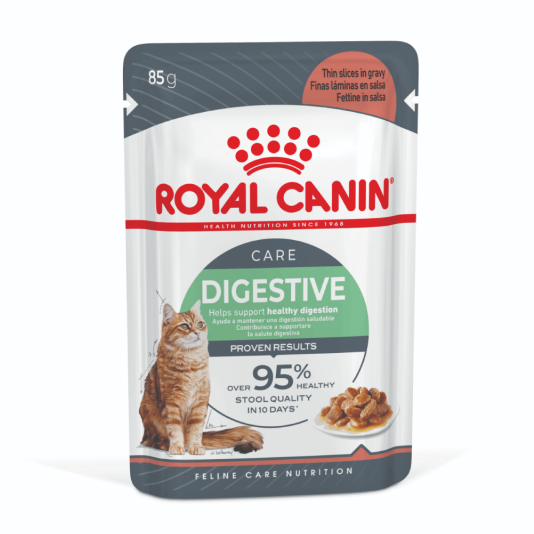
Digestive Supplements
Digestive supplements such as pre and probiotics are very popular in both human and animal medicine at the moment due to a high number of health benefits.
So what are probiotics and how do they work?
Probiotics are the "good" bacteria and yeasts that live in the gastrointestinal system, also known as the 'gastrointestinal microbiome' or 'gut microflora'. All animals have billions of "good bacteria" in their gut microbiome. These bugs help fight infections, strengthen the immune system, digest food, and produce nutrients for absorption. A healthy microbiome should have a varied and diverse population made up of a mix of different microbe species - this healthy mix is also known as 'biodiversity'.
Probiotics desposit live good bacteria directly into the gut. This helps establish populations of known beneficial bacteria in the gut by providing organisms directly.
Prebiotics deposit 'food' for the good bacteria - usually fibre - into the gut. This food helps the microbes thrive and grow.
Probiotic supplements (and some probiotic foods) provide live species known to be beneficial directly into the gut. Probiotics may help restore the natural balance of the microbiome and are particularly beneficial after a course of antibiotics which may affect this balance but are also recommended after illness or to support pets that suffer from sensitive digestion.
Looking for more information? Read our veterinary written article Probiotics and their Benefits which although is written relating to dogs, the information equally applies to cats.
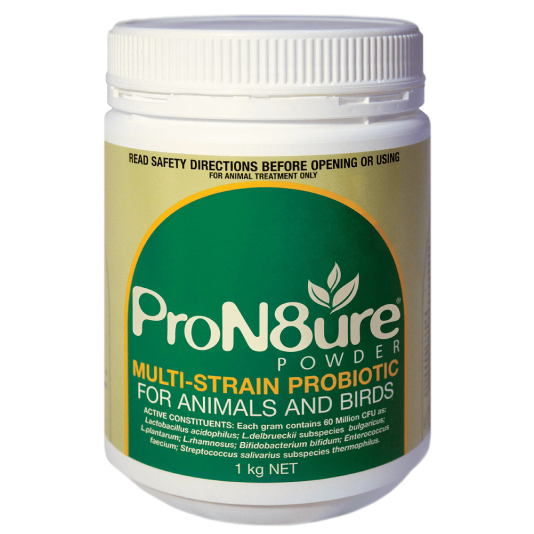
What Comes Out....
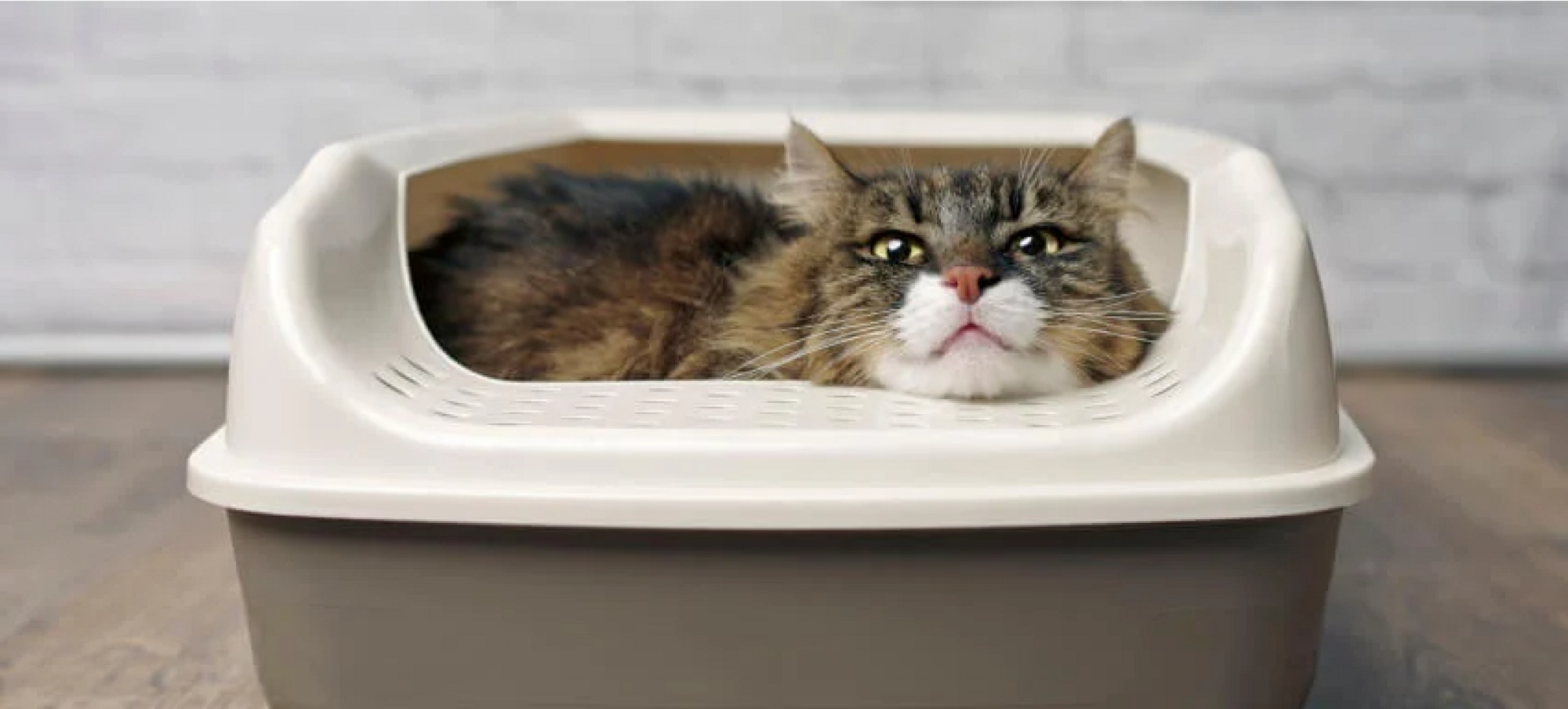
Cleaning up after your pet and dealing with what 'comes out' is certainly not the most glamorous part of pet ownership!
Despite this, scooping your cat's poop is a great opportunity to get up close and personal with their Number Two, and ensure that it is a healthy colour and consistency. The Perfect Poo should be easy to pick up, leaving minimal residue behind and is a sign of healthy digestion in your pet.
With so many clean up options on the market and increased awareness around more eco-friendly and sustainable products, it can be difficult to know what to choose that not only cleans up your pet but the environment too. See our clean up recommendations below.
Litter Varieties
There are a large range of environmentally friendly options when it comes to litter and reducing your cat's carbon paw-print. Eco-friendly options include compostable, biodegradable, sustainable or recycled litters.
Paper litter varieties such as Breeders Choice and Scrunch and Sticks are manufactured from recycled paper, free from any nasties and are completely biodegradable.
Plant-based litter such as corn, tofu and wood are comprised of natural, sustainable and biodegradable ingredients, with some varieties even compostable.
Other litter varieties can include crystal and clay which both have excellent odour control and absorbency.
Looking for more information? Read our veterinary written article Complete Guide To Cat Litter.
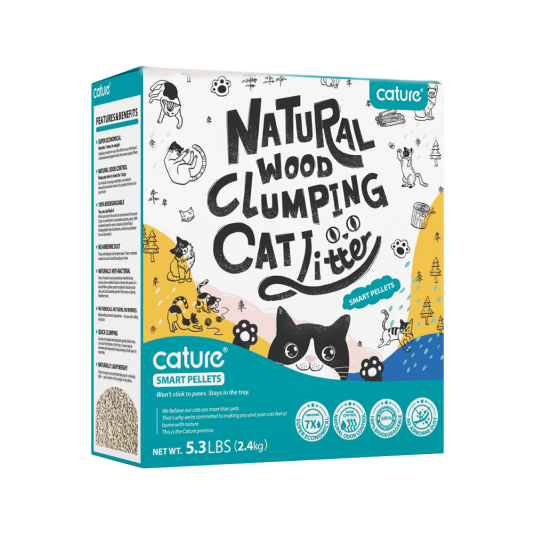
Litter Trays, Scoops and Clean Up
There is no poop scooping without a good quality litter tray and scoop. It is recommended to remove waste from your cat's litter tray daily, with a weekly clean using mild detergent.
If daily poop scooping isn't your thing, considering investing in a self-cleaning litter box which will automatically clean after every use.
Accidents happen, so it is important to ensure you have a good quality cleaner on hand that eliminates odours, not just masks them. Enzyme based cleaners penetrate the soiled area, eliminating odours at a molecular level, providing optimal cleaning and complete odour removal.
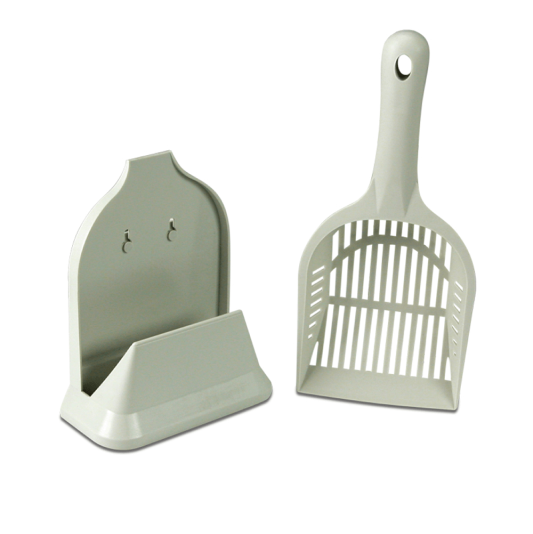
Further Reading
Want to know more? Check out our Discover Page for more tips on keeping your pets happy and healthy.